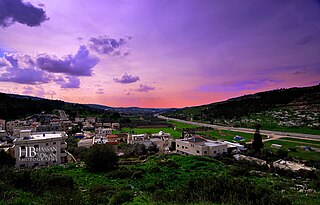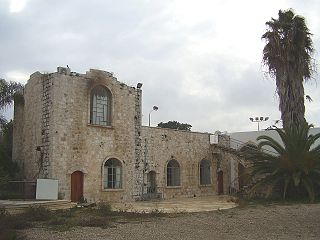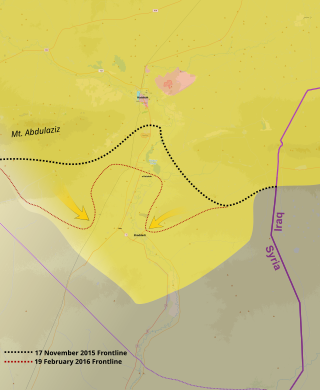Related Research Articles

Gorani also known by its main dialect; Hawrami is a Northwestern Iranian language spoken by ethnic Kurds in northeastern Iraq and western Iran and which with Zaza constitute the Zaza–Gorani languages. Gorani is considered a Kurdish dialect by many researchers.

Ara Warkes Darzi, Baron Darzi of Denham is an Armenian-British surgeon, academic, and politician.

Wadi Ara or Nahal 'Iron, is a valley and its surrounding area in Israel populated mainly by Arab Israelis. The area is also known as the "Northern Triangle".

Wadi Ara was a Palestinian village located 38.5 km south of the city of Haifa. It is named after the nearby stream that is known in Arabic as Wadi 'Ara. The village was particularly small with a population of 230 and a land area of approximately 9,800 dunums.

On 29 November 1990, the adoption of United Nations Security Council Resolution 678 authorized the assembly of a multinational military coalition to liberate Iraqi-occupied Kuwait by "all necessary means" if Iraq did not withdraw its forces by 15 January 1991. Iraq failed to do so, and the coalition began an aerial bombardment against targets in Iraq and Kuwait on 17 January 1991. At this time, the coalition consisted of 42 countries and was spearheaded by the United States. The central command was led by the United States, Saudi Arabia, and the United Kingdom; the marine command was led by the United States; the Joint Forces East Command was led by Egypt, Saudi Arabia, Syria, Morocco, Kuwait, Oman, the United Arab Emirates, Qatar, Bahrain, Poland, and Czechoslovakia; and the Joint Forces North Command was led by the United States, the United Kingdom, France, Canada, Italy, Australia, Japan, and Turkey.
Iraqi New Zealanders constitute a small population immigrants from Iraq and New Zealand-born people of Iraqi heritage or descent.

Kurdish separatism in Iran or the Kurdish–Iranian conflict is an ongoing, long-running, separatist dispute between the Kurdish opposition in Western Iran and the governments of Iran, lasting since the emergence of Reza Shah Pahlavi in 1918.

The Kurdish National Council is a Syrian Kurdish political party. While the KNC had initially more international support than the ruling Democratic Union Party (PYD) during the early years of the Syrian civil war and a strong supporter basis among some Syrian Kurdish refugees, the overwhelming popular support the PYD enjoys has eroded support for the KNC in Syrian Kurdistan, losing almost all popular support.
Arab New Zealanders refers to people from Arab countries, particularly Lebanon, Syria, Palestine, Iraq, and Jordan and also small groups from Egypt, Algeria, Tunisia, Morocco, Libya, Yemen and Sudan, who emigrated from their native nations and currently reside in New Zealand. The term also refers to descendants of diasporic Arabians such as descendants of Arab merchants to Asian nations, whose ancestral origins may be traced to merchants hailing from the Southern Arabian nations such as Yemen and Oman and the Arab nations of the Persian gulf region. Most Arab New Zealanders are of Lebanese and Iraqi descent because they were the first Arabs to arrive in New Zealand. Therefore, an Arab New Zealander is a New Zealander of Arab cultural and linguistic heritage or identity whose ancestry traces back to any of various waves of immigrants originating from one or more of the twenty countries comprised by the Arab world.

The Eastern al-Hasakah offensive was launched in the Al-Hasakah Governorate during the Syrian Civil War, by the Kurdish-majority People's Protection Units, Assyrian Christian militias, and allied Arab forces against the jihadist Islamic State of Iraq and the Levant, with the intent of retaking the areas of the Jazira Canton that had been captured by ISIL. Subsequently, the Syrian Armed Forces also launched an assault against the jihadists, without coordinating with the YPG.

The al-Shaddadi offensive (2016), also known as Operation Wrath of Khabur, was an offensive launched by the Syrian Democratic Forces (SDF) during the Syrian Civil War, in February 2016. The main goal of this offensive was to capture the strategic city of Al-Shaddadi and the remainder of the southern al-Hasakah Governorate from the Islamic State of Iraq and the Levant (ISIL). During the offensive, the US-led coalition conducted more than 86 airstrikes in Al-Shaddadi and the nearby areas, in support of the SDF advances.
The Battle of Hit, code named Operation Desert Lynx by Iraqi forces, was an offensive launched by the Iraqi Government during the Anbar offensive, with the goal of recapturing the town of Hīt and the Hīt District from ISIL. After the Iraqi forces recaptured the city of Ramadi, Hīt and Fallujah were the only cities still under the control of ISIL in the Al Anbar Governorate. Iraqi Forces fully recaptured Hīt and the rest of the Hīt District on 14 April 2016.
The Northern Raqqa offensive was a 2016 military offensive launched by the Kurdish-led Syrian Democratic Forces against the Islamic State of Iraq and the Levant in northern Raqqa Governorate, in order to prepare for a future attack on the city of Raqqa. The offensive was launched in coordination with airstrikes by the US-led Combined Joint Task Force – Operation Inherent Resolve. After 30 May, the offensive stalled, as the SDF shifted its focus and resources to another operation in the northern Aleppo Province.

The Battle of al-Rai was fought in August 2016 between the Free Syrian Army (FSA) and the Islamic State of Iraq and the Levant in the border town of al-Rai, part of the northern Aleppo Governorate on the border with Turkey, which resulted in the FSA capturing the town.

The Battle of Kirkuk took place in the city of Kirkuk in northern Iraq between Kurdistan and allies and the Islamic State of Iraq and the Levant. The battle occurred less than a week after the beginning of the Battle of Mosul launched by Iraqi security forces and allies.

Rojava–Kurdistan Region relations refers to the relationship between the Autonomous Administration of North and East Syria, and the Government of Iraq's Kurdistan Region. While they share much culturally, they also have many political differences. There has been military cooperation with Kurdistan Region and the United States in the conflict against Islamic State of Iraq and the Levant (ISIL), although neither gives official support for Rojava or its People's Protection Units (YPG). The Kurdistan Regional Government enforced a unilateral economic blockade against Rojava which has damaged and limited the region's economy. The "Sultanistic system" of Iraqi Kurdistan stands in stark contrast to the democratic confederalist system of the Rojava.
ARA News was an online news service focused on the consequences of war in Syria and Iraq. Although described as a Kurdish news agency by its director, the site started as an Arabic-only news service and as of January 2016, still published only in the Arabic and English languages, and ceased publishing around August 2017.

Violence against LGBT people is part of the ideology of ISIL, which mandates capital punishment for homosexuality within its territory, in Iraq, Syria and Libya.
In the early morning of 25 April 2017, the Turkish Air Force conducted multiple airstrikes against media centers and headquarters of the People's Protection Units (YPG) and the Women's Protection Units (YPJ) in northeastern Syria, and against positions of the Sinjar Resistance Units (YBŞ) on Mount Sinjar, northwestern Iraq. The airstrikes killed 20 YPG and YPJ fighters in Syria in addition to five Peshmerga soldiers in Iraq.